Bonjour language enthusiasts! Ready to dive into the world of French? I can say, you’ve come to the right place.
I’ll answer the question that most people wonder: What are the best apps to learn French?
This guide is all about making French learning easy with the best apps. Whether you’re just starting with a friendly “bonjour” or you’re cruising through conversations, these apps are here for you.
Let’s jump into the fun world of language apps and make learning French easy and fun.
Ready? Let’s go!
First Things First: Why Should You Learn French?
Learning French is more than just picking up a new language; it’s like going on an adventure into different cultures and grabbing opportunities around the world. Speaking French connects you with cool things like art, books, and ways of thinking from France.
Plus, it can boost your job options, especially in jobs like fashion or international business. Companies really like people who speak more than one language, and learning French can make you stand out.
And think about traveling – knowing French can make your trips way more interesting. Imagine chatting with locals in Paris or enjoying the best food in a little French village. It’s like having a backstage pass to the real deal.
If you’re into school stuff, learning French can also give you an advantage. You might get cool opportunities for scholarships and working with other schools. It’s not just about knowing words; it actually helps your brain get better at remembering things and figuring stuff out.
Talking to people all around the world becomes easy when you know French. You can make friends and get to know people from different places. And guess what? French is used in a lot of important world conversations, so speaking it might open doors to being part of big things.
So, learning French is like getting a superpower – it’s not just about words; it’s about making life more exciting and full of cool possibilities!
Quick Overview of the Best Apps to Learn French
| App | Best for | Base Price | What Makes It Stand Out |
| 1. Mondly | Beginners and interactive learning | Free (Limited features) | Engaging lessons, real-time pronunciation feedback, diverse content. |
| 2. Babbel | Practical and structured learning | Starts at $6.95/month | Structured lessons, personalized learning, emphasis on real-life conversations. |
| 3. Rocket Languages | Comprehensive program | $99.95 to $449.85 | Integrates audio lessons, cultural insights, practical dialogues. |
| 4. Rosetta Stone | Visual and auditory immersion | Starts at $11.99/month | Immersive learning, visual and auditory focus, speech recognition. |
| 5. Pimsleur | Auditory immersion | $14.95 to $19.95/month | Strong emphasis on audio learning, conversation simulations, mobile-friendly. |
| 6. FluentU | Visual exposure through real-world videos | Starts at $20/month | Authentic language exposure, interactive subtitles, diverse content. |
| 7. Busuu | Community-based learning | Starts at $6.66/month | Language exchange opportunities, structured lessons, adaptive review system. |
| 8. Memrise | Mnemonic techniques and gamified learning | Starts at $8.99/month | Engaging gamified learning, multimedia elements, diverse user-generated content. |
| 9. Italki | Personalized one-on-one tutoring | Variable costs per lesson ($5 – $30 / tutor) | Personalized tutoring, flexible scheduling, community features. |
| 10. Duolingo | Beginners and casual learners | Free (Optional in-app purchases) | User-friendly and gamified interface, covers various languages, spoken exercises. |
My Top 9 Best Apps to Learn French
1. Mondly
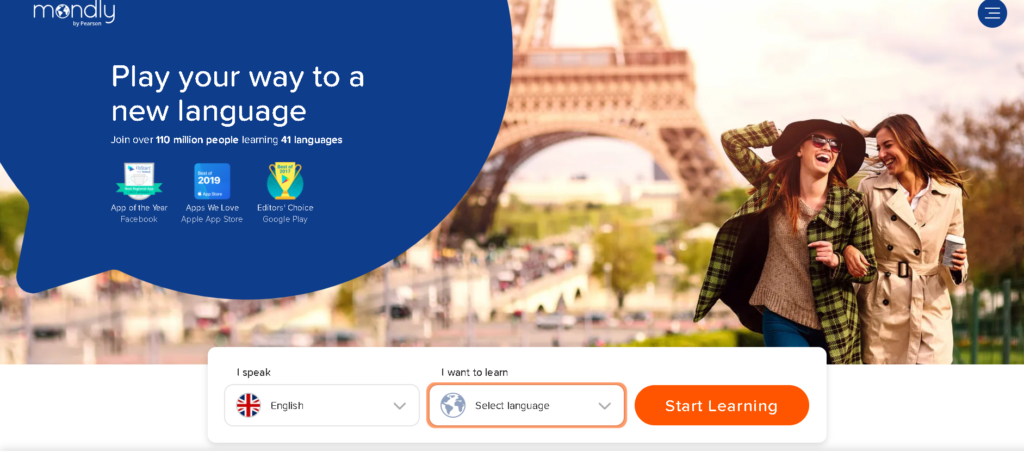
Best for: Beginners and intermediate learners who want an interactive experience.
Base Price: Mondly offers a free version with limited features. The premium subscription starts at $9.99 per month.
What I Like About Mondly:
Mondly stands out for its immersive and interactive lessons. The app uses advanced voice recognition technology to provide real-time feedback on pronunciation, making it an excellent choice for improving speaking skills. The content is diverse, covering various topics, and it adapts to your learning pace.
Check out my Mondly review if you haven’t already!
Pros:
- Engaging and interactive lessons.
- Real-time pronunciation feedback.
- Diverse content and topics.
- User-friendly interface.
Cons:
- The free version has limited features.
- Some advanced learners might find the content less challenging.
Mondly is a solid choice for those starting their French learning journey or looking to build a strong foundation in the language. Its interactive approach and real-time feedback make the learning process enjoyable and effective.
2. Babbel
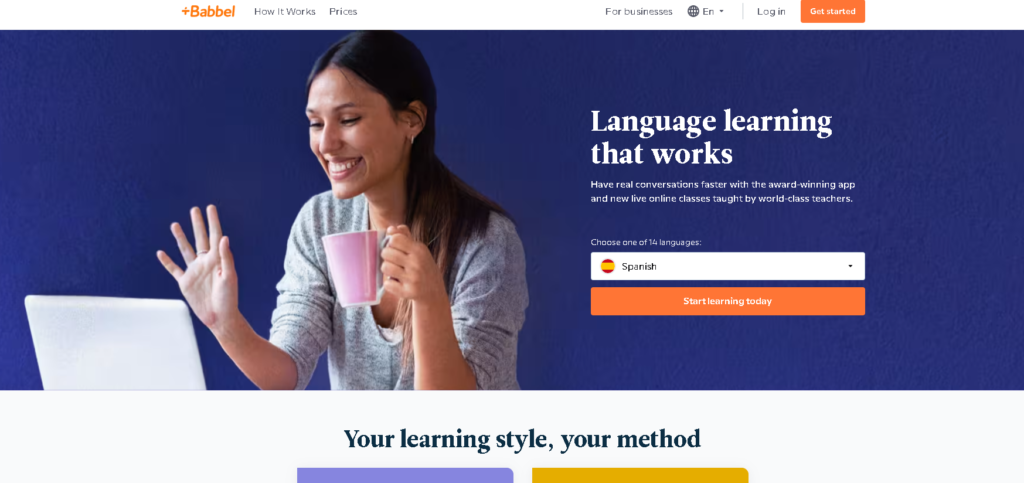
Best for: Beginners and intermediate learners seeking a structured and practical approach to language learning.
Base Price: Babbel offers a subscription-based model with plans starting at $6.95 per month.
What I Like About Babbel:
Babbel‘s strength lies in its structured lessons that focus on real-life conversations. The app tailors its content to your native language, providing a more personalized learning experience. I appreciate the emphasis on practical vocabulary and phrases that are immediately applicable in everyday situations.
I highly recommend checking out my Babbel review!
Pros:
- Structured and practical lessons.
- Personalized learning based on your native language.
- Emphasis on real-life conversations.
- Clear progress tracking and review features.
Cons:
- Limited advanced-level content.
- Less emphasis on cultural insights.
Babbel is an effective choice for learners who prefer a practical and structured approach to language learning. The focus on real-life conversations ensures that the acquired skills are immediately applicable in various contexts, making it a valuable tool for building conversational proficiency in French.
3. Rocket Languages: French
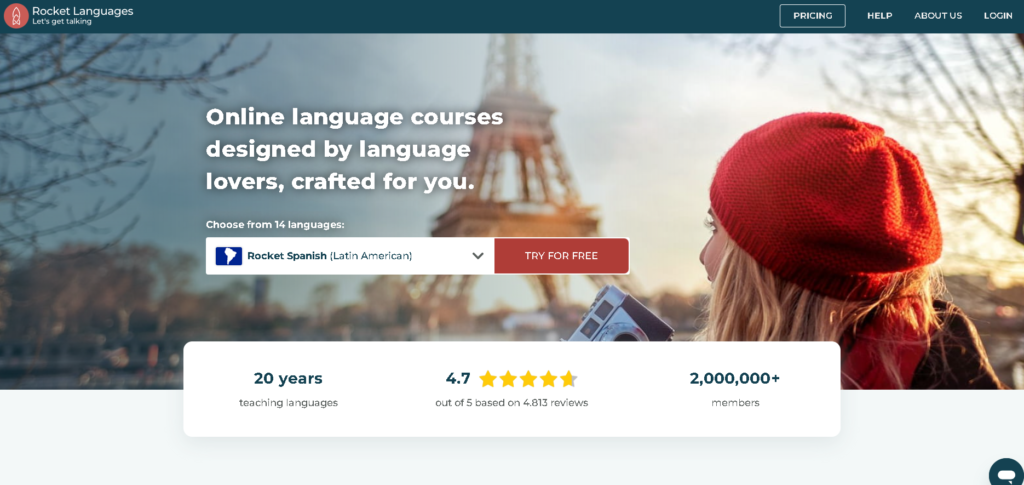
Best for: Learners of all levels looking for a comprehensive program with a focus on practical language skills.
Base Price: Rocket Languages offers various plans, with prices ranging from $99.95 to $449.85, depending on the duration and features.
What I Like About Rocket Languages:
Rocket Languages excels in providing a comprehensive language learning experience. The program integrates audio lessons, interactive exercises, and cultural insights, offering a well-rounded approach to mastering French. The inclusion of practical dialogues and situational lessons enhances real-world language application.
Pros:
- Comprehensive program suitable for all levels.
- Integrates audio lessons, interactive exercises, and cultural insights.
- Emphasis on practical dialogues for real-life situations.
- Lifetime access available for certain plans.
Cons:
- Higher price range compared to some other apps.
- Interface might be overwhelming for some users.
Rocket Languages stands out as a versatile and comprehensive language learning platform. Its focus on practical language skills, cultural understanding, and flexible pricing plans make it a valuable resource for learners committed to mastering French at their own pace.
4. Rosetta Stone
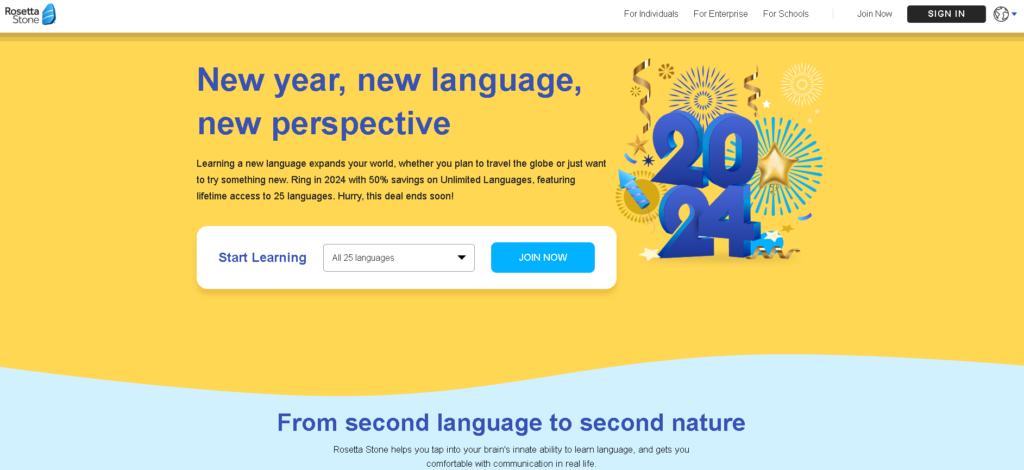
Best for: Visual and auditory learners seeking an immersive and natural language learning experience.
Base Price: Rosetta Stone offers subscription plans, starting at $11.99 per month.
What I Like About Rosetta Stone:
Rosetta Stone‘s immersive approach is commendable, focusing on language acquisition through visual and auditory stimuli. The app employs a method similar to how we learn our native language, emphasizing context and association. The speech recognition technology helps refine pronunciation, making it ideal for those who value a natural and holistic learning experience.
Pros:
- Immersive learning experience.
- Focus on visual and auditory learning.
- Speech recognition for pronunciation improvement.
- Lifetime access available for certain plans.
Cons:
- Relatively higher price point.
- Limited explicit grammar explanations.
Rosetta Stone is a strong choice for learners who thrive in immersive language environments. The emphasis on visual and auditory learning, coupled with speech recognition technology, contributes to a natural language acquisition process.
Check out my Rosetta Stone review to learn more!
5. Pimsleur
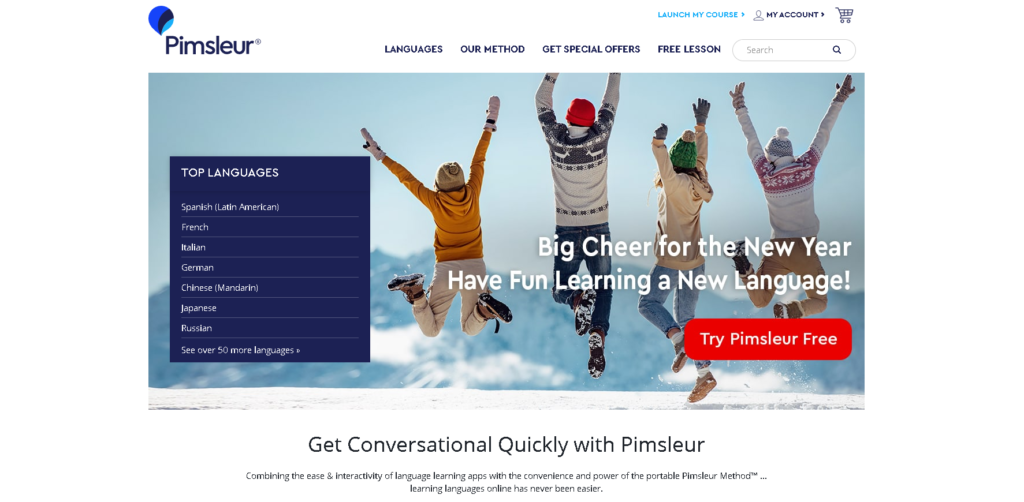
Best for: Auditory learners who prefer an audio-focused and language immersion approach.
Base Price: Pimsleur offers subscription plans, with prices ranging from $14.95 to $19.95 per month.
What I Like About Pimsleur:
Pimsleur’s strength lies in its audio-centric approach, making it an excellent choice for learners who benefit from auditory immersion. The emphasis on pronunciation and listening skills is notable, and the repetition-based learning method helps reinforce language patterns effectively. The lessons are structured in a way that encourages active participation and engagement.
Check out my Pimsleur review for a more in-depth overview!
Pros:
- Strong emphasis on audio learning and pronunciation.
- Immersive language experience through conversation simulations.
- Structured and repetitive lessons for reinforcement.
- Mobile-friendly, allowing learning on the go.
Cons:
- Limited visual or written components.
- Higher subscription costs compared to some alternatives.
Pimsleur is a great choice for anyone who doesn’t know where to start. With all the courses available its really a popular choice for many.
6. FluentU

Best for: Visual learners interested in authentic language exposure through real-world videos.
Base Price: FluentU offers subscription plans, starting at $20 per month.
What I Like About FluentU:
FluentU stands out for its use of real-world videos, making language learning engaging and practical. The curated content, which includes movie trailers, music videos, and news clips, offers an authentic language experience. The interactive subtitles, vocabulary lists, and quizzes enhance the learning process, providing a holistic approach to language acquisition.
Check out my FluentU review to learn more about this video-learning platform!
Pros:
- Authentic language exposure through real-world videos.
- Interactive subtitles, vocabulary lists, and quizzes.
- Diverse content including movie trailers, music videos, and more.
- User-friendly interface.
Cons:
- Higher subscription costs compared to some competitors.
- Limited structured lessons for beginners.
FluentU is a dynamic platform that immerses learners in real-world language usage. The use of authentic videos, interactive features, and diverse content make it an appealing choice for visual learners seeking practical language exposure.
7. Busuu
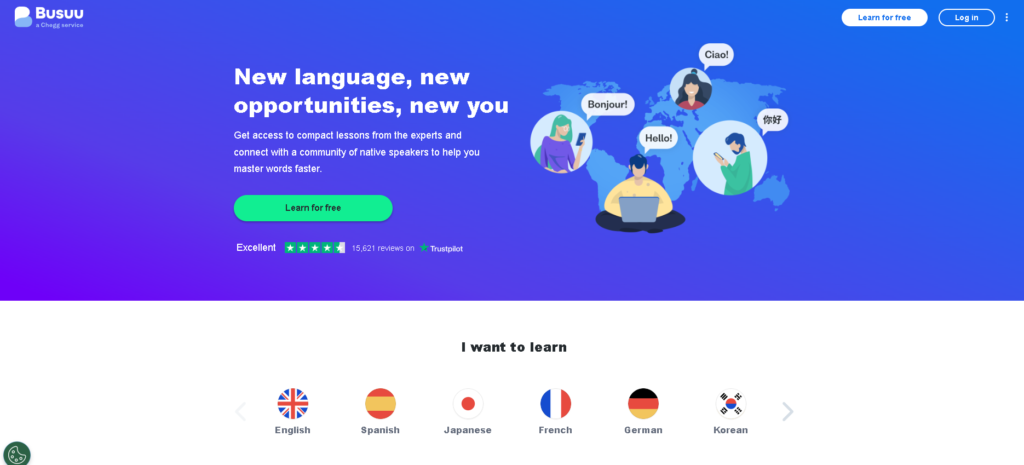
Best for: Social learners who appreciate a community-based language learning approach.
Base Price: Busuu offers subscription plans starting at $6.66 per month.
What I Like About Busuu:
Busuu’s strength lies in its community-driven approach to language learning. The platform allows users to interact with native speakers for language exchange, providing an authentic and social learning experience.
The structured lessons cover a variety of topics, and the adaptive review system ensures continuous progress. The inclusion of grammar exercises and vocabulary challenges enhances overall language proficiency.
Check out my Busuu review to get started!
Pros:
- Community-based learning with language exchange opportunities.
- Structured lessons covering a variety of topics.
- Adaptive review system for continuous progress.
- Inclusion of grammar exercises and vocabulary challenges.
Cons:
- Free version has limitations on certain features.
- Pronunciation feedback may not be as robust as in some other apps.
Busuu stands out for its community-oriented approach, making it an excellent choice for those who enjoy social interactions while learning a language. The combination of structured lessons, adaptive reviews, and community engagement adds a unique and effective dimension to language acquisition.
8. Memrise
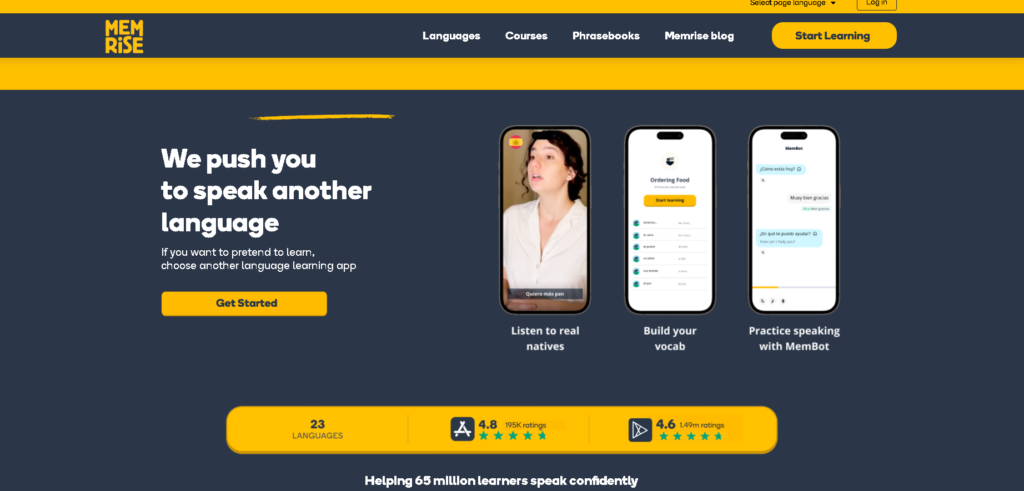
Best for: Visual learners who benefit from mnemonic techniques and gamified learning.
Base Price: Memrise offers subscription plans, starting at $8.99 per month.
What I Like About Memrise:
Memrise excels in using mnemonic techniques and gamified elements to make learning engaging and memorable. The app employs a variety of multimedia, including video and audio, to enhance vocabulary retention.
The focus on real-life language usage and cultural insights adds practical value to the learning experience. Memrise’s user-generated content also provides a diverse range of courses beyond standard language offerings.
Pros:
- Mnemonic techniques and gamified learning for engagement.
- Multimedia elements, including video and audio.
- Focus on real-life language usage and cultural insights.
- Diverse user-generated content.
Cons:
- Some may find gamified elements distracting.
- Pronunciation feedback may not be as robust as in some other apps.
Memrise stands out for its innovative approach to language learning, making it particularly appealing to visual learners who enjoy mnemonic techniques and gamified elements. The inclusion of multimedia content and a diverse range of user-generated courses contribute to a well-rounded language learning experience. While the gamified elements may not suit everyone, they can enhance engagement for those who appreciate a more interactive learning style.
9. Italki
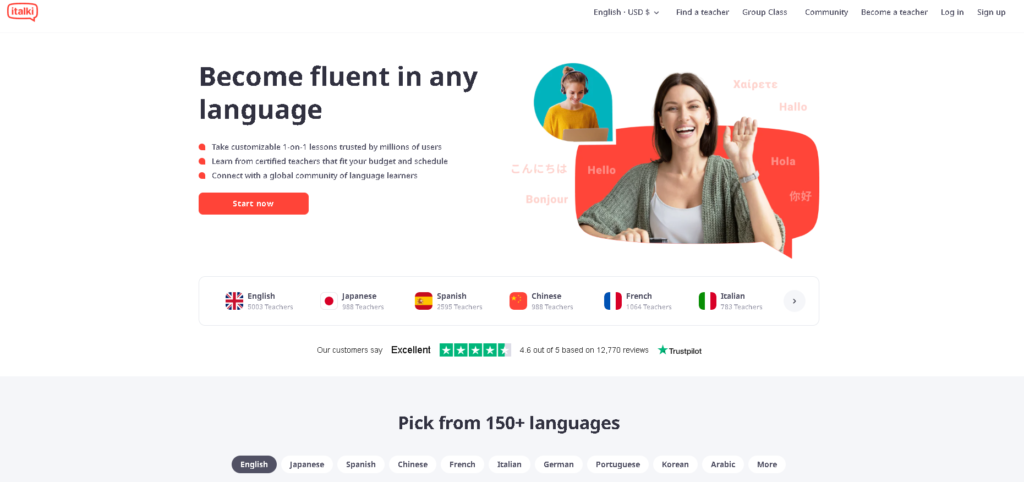
Best for: Learners seeking personalized, one-on-one language tutoring and conversation practice.
Base Price: Italki operates on a pay-per-lesson model, with prices set by individual tutors. Costs can vary but generally range from $7 to $30 per hour.
What I Like About Italki:
Italki stands out as a platform connecting learners with native-speaking tutors for personalized lessons. The one-on-one sessions offer tailored guidance, focusing on individual strengths and weaknesses.
The flexibility to choose tutors based on specific language goals, schedules, and teaching styles is a major advantage. Additionally, Italki’s community features, such as language exchanges and discussions, foster a supportive learning environment.
Check out my Italki review to see more!
Pros:
- Personalized, one-on-one tutoring for focused learning.
- Flexible scheduling and a variety of tutors to choose from.
- Community features, including language exchanges and discussions.
- Options for both professional teachers and community tutors.
Cons:
- Costs can add up, especially for frequent lessons.
- Requires self-discipline for consistent practice.
Italki provides a unique and personalized learning experience through individual tutoring sessions. The platform is ideal for those who prefer tailored guidance and conversation practice with native speakers.
10. Duolingo
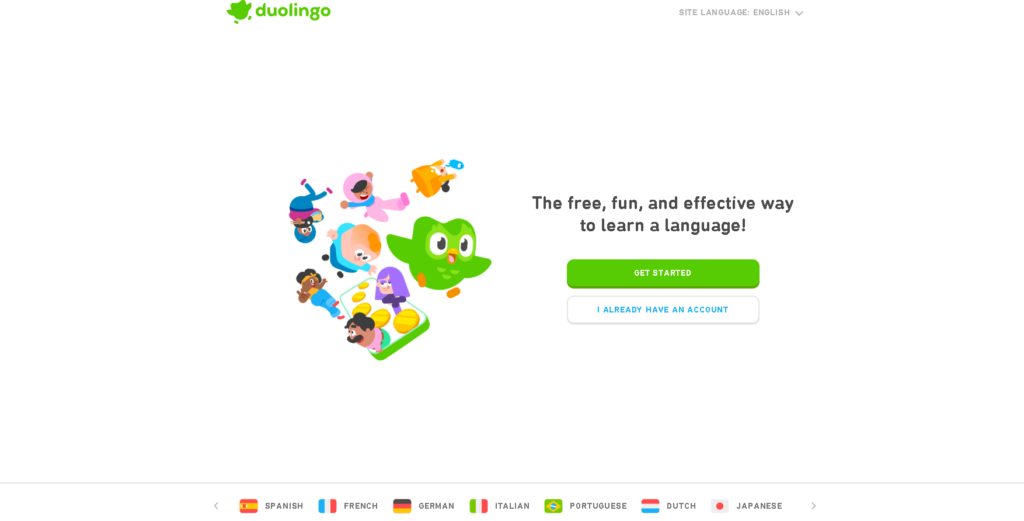
Best for: Beginners and casual learners looking for a free, gamified language learning experience.
Base Price: Duolingo offers a free version with optional in-app purchases. The premium version, Duolingo Plus, starts at $6.99 per month.
What I Like About Duolingo:
Duolingo stands out for its user-friendly and gamified approach to language learning. The bite-sized lessons, colorful interface, and engaging challenges make it an attractive option for beginners.
The app covers a variety of languages, making it accessible for learners interested in multiple language journeys. The inclusion of spoken exercises and a focus on repetition helps reinforce vocabulary and grammar concepts.
Pros:
- User-friendly and gamified interface for engaging learning.
- Bite-sized lessons suitable for quick daily practice.
- Covers a variety of languages.
- Spoken exercises and repetition for effective reinforcement.
Cons:
- Gamified elements may not suit all learning preferences.
- Limited depth for advanced learners.
Duolingo is a fun and accessible option for those starting their language learning journey or seeking casual practice. The gamified elements, variety of languages, and engaging challenges make it particularly appealing to beginners.
Is French Hard to Learn for English Speakers?
Learning French as an English speaker comes with both challenges and advantages. The difficulty of learning French depends on various factors, including your language learning experience, motivation, and the strategies you use.
Let’s explore the aspects that might make French challenging or manageable for English speakers.
1. Similarities between English and French:
French and English share a significant amount of vocabulary due to historical and cultural influences. This similarity can ease the learning process as many words have recognizable counterparts in both languages.
2. Pronunciation Challenges:
French pronunciation, with its nasal sounds and unique vowel sounds, can be a challenge for English speakers. You’ve probably heard a French person speak before; you also probably didn’t understand a word of what they’ve said.
However, consistent practice, exposure to native speakers, and the use of language learning apps with pronunciation exercises can significantly improve pronunciation skills.
3. Grammatical Differences:
While both English and French belong to the Indo-European language family, they have distinct grammatical structures. French nouns have gender, and verbs are conjugated more extensively. Understanding these differences is crucial but can pose a challenge for English speakers.
4. Motivation and Consistency:
The motivation to learn French and the consistency of practice play significant roles in overcoming challenges. Setting realistic goals, maintaining a regular study routine, and seeking immersion experiences can contribute to successful language acquisition.
In conclusion, while French may present certain challenges for English speakers, it also offers familiarity in vocabulary and shared linguistic roots. With dedication and consistent practice, learning French can be a rewarding and achievable endeavor for English speakers.
How Long Does It Take to Learn French?

The time it takes to progress through language proficiency levels in French varies widely based on individual factors. Here is a general indication of the time it might take to reach different levels:
Beginner:
With consistent daily practice, a dedicated learner might achieve basic conversational skills within 3 to 6 months. This level involves understanding and using common phrases, introducing oneself, and engaging in simple conversations.
Intermediate:
Building on a beginner foundation, reaching intermediate proficiency may take an additional 6 to 12 months. At this level, you can participate in more complex discussions, express opinions, and navigate various real-life situations with increased confidence.
Advanced:
Moving from intermediate to advanced proficiency typically takes 1 to 2 years of continuous learning. At this stage, you should comfortably handle nuanced conversations, understand intricate texts, and demonstrate a broader vocabulary.
Expert:
Reaching an expert level in French, equivalent to near-native proficiency, is a long-term commitment that may take several years of immersive experiences, advanced study, and ongoing practice. Expertise involves fluency in diverse topics, mastery of complex grammar, and the ability to communicate with native-like precision.
It’s important to note that these estimations are general guidelines, and individual progress may vary based on factors such as learning methods, frequency of practice, and prior language learning experience. Consistent, focused effort and a variety of learning experiences contribute to more efficient language acquisition.
Best Ways to Learn French: Apps vs Books vs Podcasts
Choosing the best way to learn French depends on your preferred learning style, schedule, and goals. Here’s a comparison of three popular methods: apps, books, and podcasts, to help you decide which might suit you best.
1. French Learning Apps:
Pros:
- Interactive Learning: Language learning apps like Duolingo, Babbel, and Rosetta Stone provide interactive lessons, making learning engaging and dynamic.
- Flexibility: Apps offer flexibility in terms of when and where you can practice, making them suitable for on-the-go learning.
- Gamified Approach: Many of these best apps to learn French use gamified elements, turning the learning process into a fun and rewarding experience.
Cons:
- Limited Depth: Some apps may lack the depth needed for advanced learners who require in-depth grammar explanations.
- Isolation: Learning through these best apps to learn French might lack the social and cultural context that other methods provide.
2. Books:
Pros:
- Comprehensive Resources: Language learning books often provide comprehensive coverage of grammar rules, vocabulary, and cultural insights.
- Structured Learning: Books typically offer a structured approach, guiding learners from basics to more advanced concepts.
- Reference Material: Books serve as valuable reference materials for reviewing grammar rules and vocabulary.
Cons:
- Limited Interaction: Books lack the interactive elements found in apps or the real-world exposure offered by podcasts.
- Potential for Boredom: Some learners may find traditional textbooks less engaging, leading to a loss of interest over time.
3. Podcasts:
Pros:
- Real-world Exposure: French podcasts offer exposure to authentic language usage, helping learners understand colloquial expressions and diverse accents.
- Flexibility: Podcasts allow for learning on the go, making them a convenient option for incorporating language practice into daily routines.
- Cultural Insights: Podcasts often provide insights into French culture, enhancing overall language understanding.
Cons:
- Limited Structure: Podcasts may lack a structured approach, making them less suitable for beginners who benefit from step-by-step learning.
- Potential for Distractions: Learning through podcasts might be challenging for those easily distracted in auditory environments.
The best way to learn French ultimately depends on your preferences and learning objectives. Combining multiple methods, such as using apps for interactive practice, books for in-depth study, and podcasts for real-world exposure, can create a well-rounded and effective language learning experience.
Experiment with different approaches to find the combination that works best for you.
Wrap Up: Best Apps to Learn French
Learning French is a fantastic journey, and picking the right tools is super important. There are lots of apps out there, like Duolingo or Rosetta Stone, that make learning interactive and easy.
Books are like a timeless guide with lots of info about French grammar and culture. Podcasts are cool too, giving you a taste of real French life and language.
To really nail French, you might want to mix things up. Use apps for fun practice, books for solid learning, and podcasts for that authentic French feel.
Just remember, the best way to learn French is the way that suits you. So, whether you’re into one of these best apps to learn French, digging into French books, or tuning into podcasts, stick with it, enjoy the process, and get ready for a rich adventure into the French language and culture.
Frequently Asked Questions (FAQ)
1. What is the best app for learning French?
The best app depends on your learning preferences. Pimsleur, Babbel, Rosetta Stone, and Mondly are popular choices offering different approaches. Experiment with a few to find what suits you best.
2. How long does it take to become fluent in French?
Becoming fluent varies, but basic conversational skills might take 3-6 months. Achieving fluency can take years of consistent practice, immersion, and dedication.
3. Are language learning books still effective?
Yes, books provide comprehensive information on grammar and vocabulary. They are valuable for structured learning, but combining books with other resources enhances overall language acquisition.
4. Is it necessary to visit a French-speaking country to learn the language?
While immersion helps, it’s not necessary. Online resources, language apps, and virtual interactions with native speakers can provide effective learning experiences.
5. Can I learn French for free?
Yes, many language apps offer free versions. Additionally, online platforms and resources provide free content. However, premium versions may offer additional features and more comprehensive learning experiences.
6. How can I practice speaking French with native speakers?
Language exchange platforms and apps, like Tandem or HelloTalk, connect language learners with native speakers for virtual language exchange. Websites like Italki also offer opportunities for one-on-one language tutoring. (Check my Italki review for more)
7. Can I learn French on my own, or do I need a tutor?
You can certainly learn French on your own with the abundance of online resources. However, a tutor, either in person or through online platforms, can provide personalized guidance and valuable feedback.

